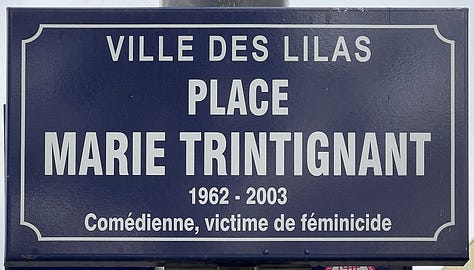In Review: "From Rock Star to Killer"
....a Netflix documentary series that brought me back to a dark, infernally hot Parisian summer, & is part of a much-needed reckoning with femicide in France



In the summer of 2003, I was an intern reporter at the Associated Press bureau in Paris. I came in expecting a “slow news” vibe— after all, little typically happens during the summer months in the capital, with politicians off work and news coverage typically focused on sports and “lifestyle” stories. But two major events changed all that: a deadly heatwave that killed thousands of people across France, & the “accidental” death of beloved French actor Marie Trintignant after her boyfriend, the rock star Bertrand Cantat, violently assaulted her in a hotel room.
My summer as a fledgling reporter was deeply marked by these two disturbing events, and while I went on to write several stories about the heat wave and its impact on the city, I toiled over several drafts of a “view from France”-type piece on the murder of Trintignant— a case the French press was almost resoundingly calling a “crime of passion”.
I never finished or published that story, something I’ve long attributed to my then-limited skills as a journalist and cultural commentator. I was only 23 at the time, and this was my first real gig as a journalist. It was easy to chalk it all up to being green.
But after watching a recent Netflix documentary series on the case, I’ve come to view my failure to finish that draft in a different light. From the beginning, I instinctively rejected the premise that Trintignant’s brutal murder was a “crime of passion”, but writing at a time when the term “femicide” wasn’t yet in usage— and the cultural habit of dismissing domestic violence was even more deeply entrenched than it is today—I think it felt impossible to buck the reigning narrative and make a good case to my Editors for a different one.
I also seem to remember (it’s all coming back!) suggesting that the case wasn’t being taken seriously enough as a prominent case of domestic or intimate violence, and getting a tepid response. Was this really news, or little more than fodder for the entertainment section: a piece that wouldn’t likely get much traction with English-speaking readers, who would be unfamiliar with the French celebrities involved?
I believe the Editors likely thought it was the latter. I scrapped my story, sensing their lack of enthusiasm and support.
Over two decades later, the Netflix mini-series seems like a crucial corrective to the heinous idea that a famous woman “died from love”, and that her murderer Bertrand Cantat was deserving of pity and understanding for the threats his crime posed to his career. As lead singer of the much-hallowed indie rock band Noir Désir, wasn’t this unfortunate “crime of passion” something that he would have to now suffer from for the rest of his life? And hadn’t Marie Trintignant been a “difficult” woman who enjoyed a good row, who was known for “provoking” the anger of those around her? Surely Cantat wasn’t a constitutionally violent person capable of doing this again— he was just deeply in love, and things had “gotten out of hand” after a passionate argument between the couple turned physical.
These were the sorts of ideas that dominated French headlines at the time— both in august national newspapers like Le Monde and Libération and in celebrity tabloids.
Keep reading with a 7-day free trial
Subscribe to Paris Unlocked Newsletter to keep reading this post and get 7 days of free access to the full post archives.



